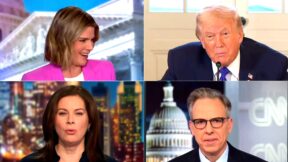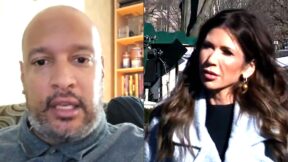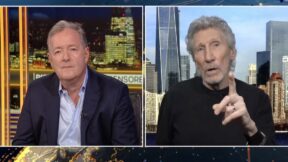WATCH: Maggie Haberman Takes Questions on Trump Trial From CNN Viewers — Including One Named ‘Boom’
New York Times reporter Maggie Haberman took questions from CNN viewers on former President Donald Trump’s hush money-election interference trial, including one named “Boom.”
It was a busy week at Trump’s trial, and Haberman was at the center of it when she became the first to report that Trump fell asleep in court — which he then did at least two more times. But the scribe has been reporting on Trump for decades, and is considered the foremost expert on the subject.
Haberman was a guest on Wednesday night’s edition of CNN’s Laura Coates Live, during which anchor Laura Coates asked her audience to call in with any questions they have about the trial. Boom had a good one:
COATES: Listen, Maggie, stick around, please. I have a lot of questions at home, I’m sure you all do, about this trial, and Maggie’s going to help answer some of them right now. If you, of course, want to participate, just go to CNN.com/TrumpTrialQuestions, fill out the form, type in your question there, and we’ll reach out to have you call in as the trial unfolds.
Let’s go to our first caller tonight. We’ve got Boom from Toronto. Hey, Boom, what’s your question?
BOOM, CALLER FROM TORONTO (via telephone): Hey, Laura. The delayed tactics of the Trump legal team have failed to prevent the hush money trial from beginning, before the 2024 election. Do you think now that Trump wants a quick trial, or will they attempt to harp on every detail which would have the consequence of keeping mostly unflattering topics discussed every day until the trial is over?
COATES: That’s a great question. I think, ultimately, he didn’t want this to happen at all as a trial. And now that it’s here, I think it’d probably be prudent politically to have the trial concluded before it drags on all the way up into the election, having potentially salacious details come out.
But, again, Maggie, I want to hear your take on this point because the delay tactics did not work here. Does he want this to go quickly now or draw it out?
HABERMAN: No, he wants to draw it out. He was very explicit about that this week in court, talking to reporters in the hallway outside the courtroom. He was criticizing Justice Merchan for moving too fast. I mean, this is an extremely quick jury selection process so far. It’s very striking. But his folks want to delay for two reasons. They want to delay in terms of the election.
They want to try to get this, you know, as close to the election as possible because they think that that is politically more helpful to him. They also want to try to have as many issues they can raise on appeal as possible. And so, you know, an appeal would mean that they think that they have a likelihood of losing, but those are the options they’re trying to preserve.
COATES: Let’s go to Colleen from Ludington, Michigan. What’s your question?
COLLEEN, CALLER FROM LUDINGTON, MICHIGAN (via telephone): Yeah, Laura. I was curious on why are they allowing Mr. Trump to speak before the trial and after the trial every day at the courthouse.
COATES: That’s a great question. First, Maggie, who is the “they?” Because is the “they” Trump allowing himself? Are his lawyers able to control him and not have him talk?
HABERMAN: No. I mean, for the same reason that, you know, his lawyers often struggle to get him to follow their suggestions or warnings, and we’ve seen that repeatedly. He considers himself his own best spokesman and lawyer, he wants to talk and he wants to defend himself, and he wants a lot of media around this case. He has said that explicitly to aides and advisors and allies. So, if the “they” is his campaign, that’s why.
In terms of the media, there’s a great public interest in this trial. The media is going to ask questions of the person who is the presumptive Republican nominee for president.
COATES: He’s got to dance on the pin — on the head of a needle, though, when you think about trying to abide by the gag order, wherever the judge ultimately will order. I would suspect it will be more opportunities to judge to say, listen, here’s what you can and cannot do going forward. Whether he’ll abide by that, anyone’s guess.
Greg from Hartford, where I was actually born. Hartford, Connecticut. What’s your question, Greg?
GREG, CALLER FROM HARTFORD, CONNECTICUT (via telephone): How do you respond to the assertion from Trump and his supporters that Trump’s actions were harmless and charges were only brought against Trump because he is a political opponent?
COATES: Well, gosh, you know, I hear this a lot, that he’s only being targeted for that reason. But this is not a law that was created just for Donald Trump. It has been on the books. It has been prosecuted before. There are other issues surrounding it. So, I think it really is a tactic politically to try to undermine the credibility of the D.A.’s office and what’s being done here. But at the end of the day, the jurors are going to have to figure out whether the prosecution has met their burden of proving that this was somehow actually criminal conduct that they can prove beyond a reasonable doubt. They can’t rely just on one’s gut. They have to prove it in this instance. And so, he will continue to make this argument about him against the world as a proxy for every American voter, but the prosecution has got to make sure they can meet their case.
Heather from Sevierville, Tennessee, what’s your question?
HEATHER, CALLER FROM SEVIERVILLE, TENNESSEE (via telephone): Hi. I was just wondering, will the pool reporters allowed in the room be rotated throughout the trial? And also, how did Maggie Haberman end up in there on day one?
COATES: I’ll let you answer that. How do you get everywhere you need to be all the time?
(LAUGHTER)
HABERMAN: So, two answers there. There are only pool reporters in the courtroom right now because there’s jury selection going on. When there’s not jury selection going on, there’s going to be upward of 60 reporters in the courtroom every day. The rest of us for now are in the overflow room. Many of us will be there throughout the trial. I will be, too.
I happened to be in the pool rotation on Monday afternoon. It was just my slot. My colleague, Jonah Bromwich, had done the morning pool rotation. “The New York Times” was part of the pool that day. I’ll be part of the pool again tomorrow.
COATES: When Trump saw you, what was his reaction? I’m always curious.
HABERMAN: He stared at me for a few seconds, and then he left the courtroom.
COATES: A good stare?
HABERMAN: I don’t feel I’m capable of assessing the stare. He didn’t look happy.
COATES: I’ll come with you next time. I’ll assess that stare. Thank you so much, Maggie.
Watch above via CNN’s Laura Coates Live.





Comments
↓ Scroll down for comments ↓